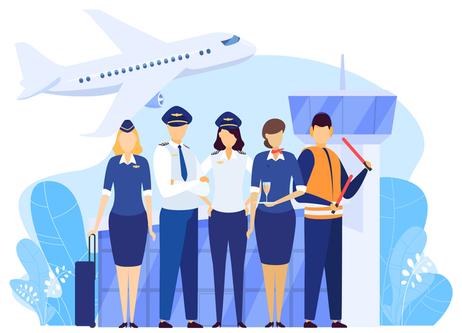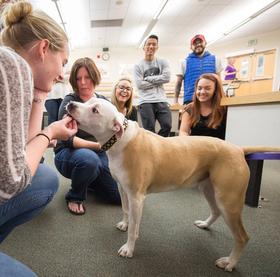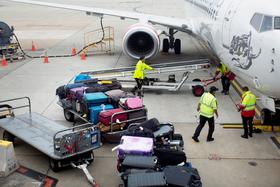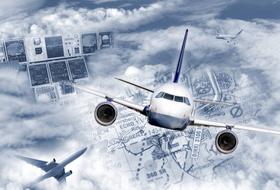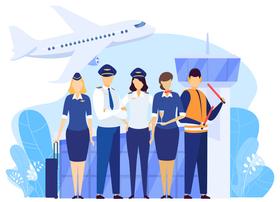Careers: Airline Industry
The COVID pandemic of 2020-2021 wreaked havoc on the airline industry. Passenger traffic dropped 61% in North America and 60 to 70% worldwide. 2020 was the worst year ever for the airline industry, according to the IATA. Both the travel and the airline industry had to downsize. That meant offering retirement packages to some employees and furloughing others. Many employees were laid off or terminated as the airlines struggled to cope with the sudden downturn in passenger traffic. Approximately 400,000 people lost their jobs due to the loss of business. When an entire industry sheds such a large number of employees, severe downsizing has a ripple effect throughout all the related and ancillary businesses that service the airlines. In 2020 that ripple effect was profound. However, 2021 saw things beginning to get back to normal.
Training for new opportunities
When businesses are hiring, your community college offers the training you need to take advantage of the many opportunities now available in the airline industry. In addition, when most airline industry employees took those retirement packages, they would not be returning to work for the companies that laid them off. That, in turn, creates openings for people like you who want to be part of an industry with many working parts.
Why work at an airport?
Read Six Reasons the Airport is the Best Place to Work to get an idea of what it's like to work at an airport. The typical mid-sized airport is hundreds of jobs to fill.
Besides needing pilots and flight attendants, airlines need customer-facing employees such as reservations, customer service staff, passenger service, and station agents. They also need people behind the scenes, such as information systems specialists, HR staff, flight dispatchers, schedulers, and dozens more jobs. See Airlinejobfinder for a comprehensive list of jobs.
The related and ancillary businesses - the so-called industry supply chain - offer thousands more job opportunities. The companies that repair engines cater the food, fix the avionics, operate the tugs, handle the baggage, etc., have openings as the travel sector ramps back up. All the retail and food service businesses need employees to serve passengers who need coffee, a snack, a book to read, etc. Janitors and other housekeeping personnel keep airport facilities clean.
What about government jobs? You've seen the job postings on social media for TSA staff. The FAA also has openings for flight controllers and supporting staff.
So there you have it. The openings are there. It's an exciting field.
This video lists the top jobs in the aviation industry.
How to find a job
What's your next step? First, decide what kind of airline industry job you want. Then find the courses at your local community college that will prepare you for those jobs.
For example, how about working as a baggage handler? To see the openings in your area, search Google with this search string: "baggage handler Raleigh NC." This produces dozens of results, including the name of a logistics company that provides baggage handling services for airlines at Raleigh Durham Airport. 13 airlines serve RDU, which has about 180 daily flights, typical for a mid-sized American airport. What qualifications do you need to be a baggage handler? A high school diploma is the only academic qualification you need. But you don't have a high school diploma? You can earn your GED at your community college. In addition, your community college offers courses to help you learn how to write a resume, job search, and apply for a job. For example, Wake Tech here in Raleigh, North Carolina, has a career tool it calls Career Lens Lab. It offers comprehensive resources to help you with your job-seeking.
This video offers a glimpse at what a baggage handler does.
Variety of positions
In the example above, we have looked at only one position in the airline industry, baggage handling. Airports have hundreds of jobs. Explore them thoroughly. Find something that suits your qualifications and interests. As Job Money notes:
As with any large company, airlines and airports hire people of all ages and experience levels with a variety of business skills. Jobs range widely, including skilled and technical positions such as accountants, catering managers, financial experts, attorneys, airport managers, pilots, navigators, mechanics, and engineers. Airlines and airports also hire a huge number of people for entry-level and nontechnical jobs, including customer service agents, flight attendants, baggage handlers, servicepersons/maintenance staff, and airline ticket agents. Source: Job Money
FBO
Besides the commercial airline operations at the airport's main terminals, most airports have FBOs or fixed base operations facilities. FBOs service the general aviation flyers and other private and non-scheduled planes. These folks need a place to park their aircraft and get them fueled and serviced. They also offer lounges and other facilities for passengers and staff. FBOs offer most of the jobs you will find in commercial airline terminals. The difference is that FBOs are much smaller and will have fewer jobs.
In aviation, the acronym FBO is short for fixed base operator. While this term is known worldwide, it is more common in the United States. A fixed base operator is a commercial operation that provides aviation services to both major airports as well as smaller airports and hangars. Source: Flying Magazine
Freight
Major freight haulers such as UPS and FedEx have cargo at airports. They employ trained staff who know how to load air freighters safely. The distribution of weight on an airplane is critical. Freight must be properly tied down because you can't allow anything to shift in the cargo hold. That might cause the plane to lose control and crash.
Emergency services
Skilled firefighters are on duty 24/7 at most airports. If firefighting is your thing, explore the airline industry's opportunities. The related emergency services such as first-responders and security staff are coupled with firefighting. Since 9-11, airport security has become a major focus for every aviation facility. In addition, you will find emergency management jobs at every airport. Your community college offers emergency management service training.
The Emergency Services Training Center is committed to providing accessible, high quality, and cost effective emergency responder training in Emergency Medical Services, Firefighting, Technical Rescue, and Law Enforcement. Our programs strive to develop skilled responders, empowering them to act more effectively in emergency situations. Source: Central Carolina Community College
This video offers a look at the job firefighters do at Minneapolis-St. Paul Airport.
The opportunities in the airline and related industries are virtually limitless. Take advantage of the situation.
Questions? Contact us on Facebook & Instagram. @communitycollegereview

